The ‘Deep Dish’ on Composable: 6 Tasty Takeaways from the MACH Alliance’s 2025 Conference
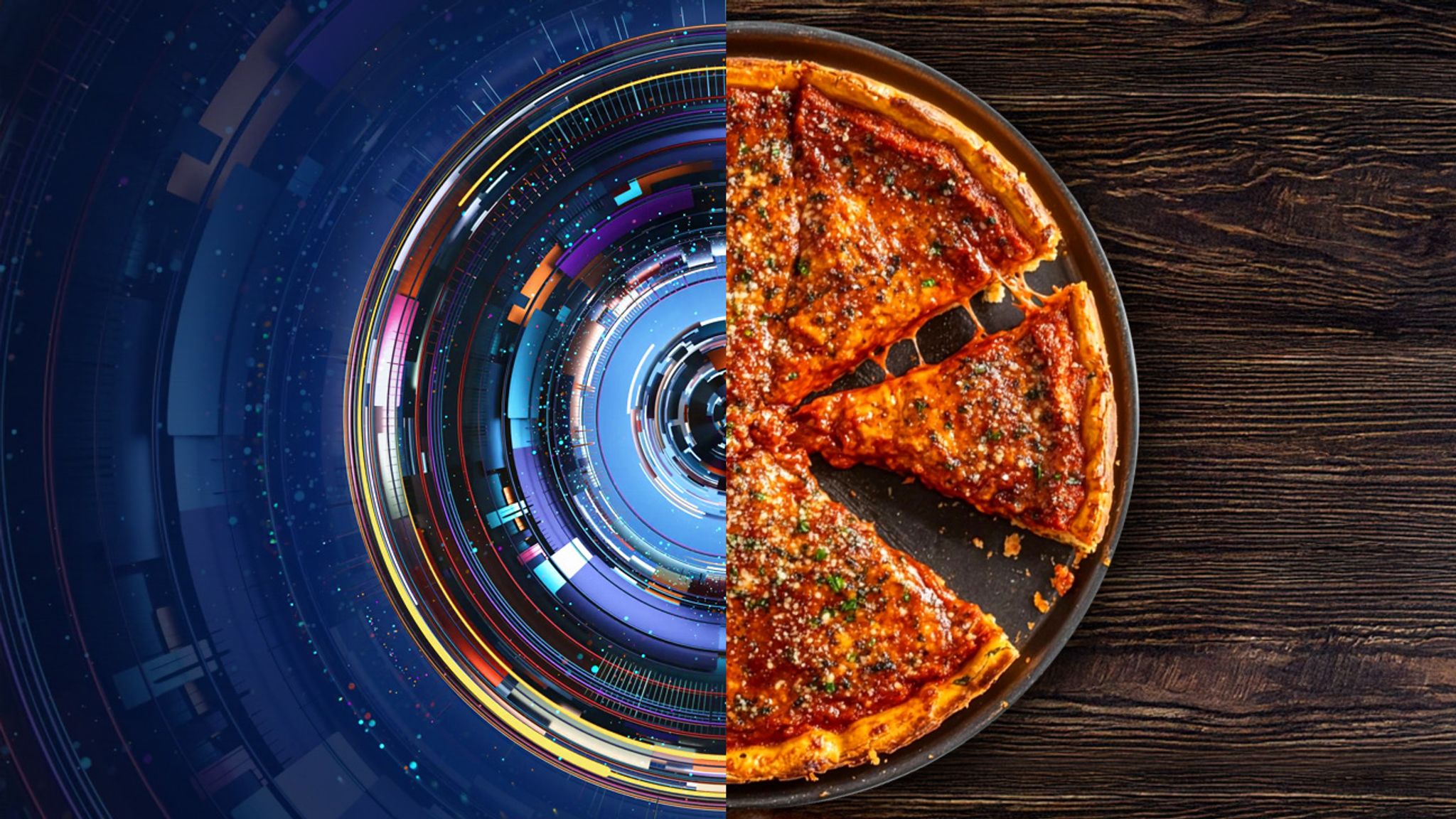
As composable continues to transform the market, the MACH Alliance is evolving its recipe. That was evident at “The Composable Conference,” the advocacy group’s fourth annual global event. There were lots of layers in this year’s pie, but the buttery crust is still about people and community. Here are a few of the big flavor notes from Chicago.
TL;DR: Yes, it was a big conference with a LOT of insights, so bring a snack for this one.
When it comes to pizza, I’m a bit of a purist. I grew up in the space between New York and Boston, so my heart will always fold like a slice of Brooklyn’s best.
But I have to admit: There’s something about Chicago’s deep dish that’s simply undeniable.
If you haven’t indulged, give it a shot. The signature reversal of toppings – cheese on the bottom, meat and veggies in the center, sauce on top – might just blow your mind.
Last week, while I was at “The Composable Conference” in the windiest of cities, I kept thinking about the similarities between Chi-town’s iconic deep dish pie and the tenets of composability. Like legacy tech, the traditional Napoli-inspired formula is dominant. But Chicago’s fare, while more difficult to find, offers a unique alternative.
Deep dish is also about layers. Lots of integrated pieces. Longer prep and cook times. It’s not as easy to toss together as Joe’s, but the unique recipe gives it a richer, more evolved bite. And that crust. Oh baby… It’s all about the crust.
Like deep dish, composable isn't for everyone. I recall the former Alliance president, Kelly Goetsch, taking a very firm stance on this back in 2022 on LinkedIn.
“I love MACH, but regularly tell people MACH is not for you and then promptly refer them to Shopify,” he said. “MACH isn't for everybody – whether due to a lack of a proper use case or an inability to successfully implement and care for it.”
He wasn’t being antithetical; he was just admitting that composable is hard. While the benefits of futureproofing are fairly evident, the reality is that MACH requires more than just the right technology. It requires a specific mindset – from planning to execution – and the right teams to support it all. This is where the Alliance does its best work: providing a strong architectural recipe and the best possible ingredients to achieve success.
As a CMS analyst and market watcher, I’ve kept a steady eye on the headless platforms that have flocked to this cohort, looking for a competitive advantage. For some vendors, being part of the Alliance’s open, best-of-breed technology ecosystem has provided greater collaboration with other key technologies and an edge on RFPs.
But other voices haven’t been as bullish, reducing the ecosystem to nothing more than a marketing platform with stringent, exclusionary requirements. These conflicting perceptions have resulted in a fair share of controversy over the last few years, with certain vendors sharing their criticisms openly and myriad technologists stirring the social pot. Most recently, a MACH member publicly called out the friction and limitations of its rigid frameworks and “pure composability." More on that in a bit.
At the crux of all this is the very definition of composable. Since I attended MACH TWO in Amsterdam in 2023, that word has become the domain of just about everyone. And in our corner of the CMS and DXP categories, we’ve seen legacy platforms embrace a more modular posture to compete against MACH’s growth, calling their own headless and SaaS solutions “composable.”
If buyers weren’t confused before, they certainly are now.
So what does it mean to be composable in 2025?
It’s a question that deserves a deep dish – and exactly why the Alliance’s annual event is such a vital part of the tapestry. It provides a platform for conversation and clarity as composable continues its evolution and new technologies like agentic AI enter the stage.
Given the confusion, it’s not surprising that the MACH Alliance is evolving its own recipe, shedding the focus on a mouthful of an acronym (say it with me: Microservices, API-first, Cloud SaaS, Headless) and focusing on the foundational benefits of composability. This was crystallized in the re-naming of “The Composable Conference,” which felt a bit like reasserting its power and relevance.
Let’s talk about the event itself. Now in its fourth edition, the Alliance is hitting its stride and optimizing the experience. Overall, this Chicago chapter was executed with finesse, including the event format, location, and accouterments. I spoke to several attendees who said it met or exceeded their expectations, from the customer sessions to the general format.
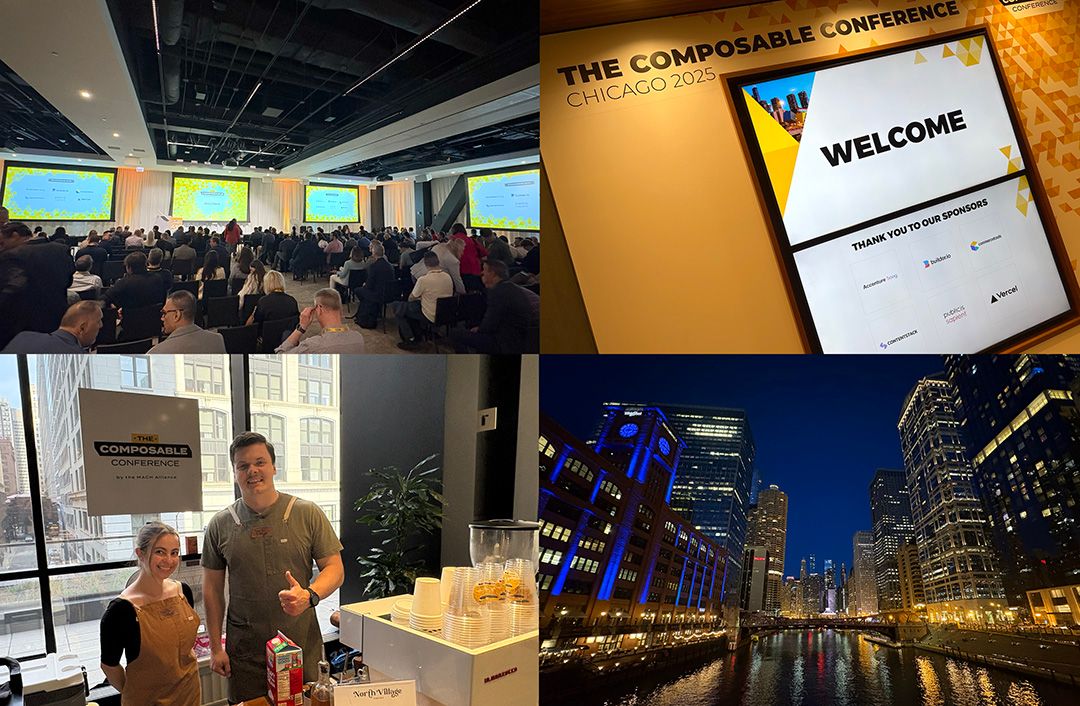
Scenes from “The Composable Conference” in Chicago.
This year, attendees were able to follow content tracks that catered to their level of maturity, from “MACH Curious” to more advanced states. People seemed largely upbeat about this segmented approach, which provided more scaffolding across their two days.
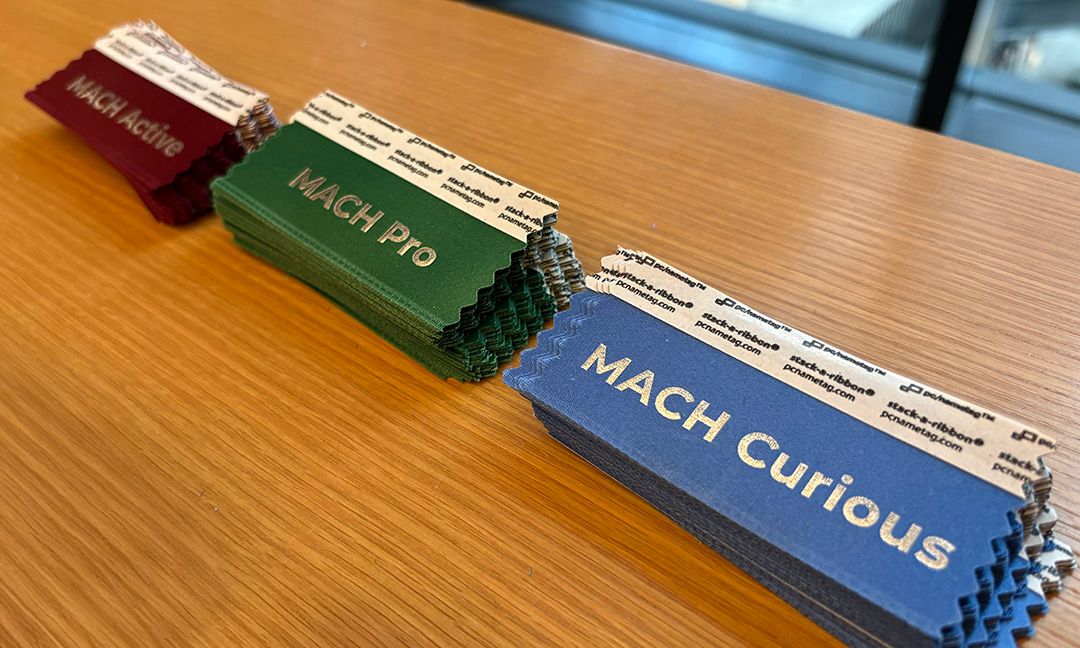
Attendees could add badges to signal their maturity as “MACH Curious,” “MACH Active,” or “MACH Pro.”
Throughout the conference, I made a point of speaking with new members who were very early on their transformation journey. Some brought more hands-on staff to learn and absorb. Opening the event to both leaders and practitioners was a huge win, as it helps reinforce teams with a successful MACH mindset.
Of course, there were detractors. A few attendees related to me that they still felt lost at the end, that there weren’t enough actionable steps to move things forward. I think the horizon of tools and resources is continuing to expand, but this is still challenging stuff.
And as you might expect, some visitors mentioned the friction around attending a U.S.-based conference in light of the current political strife and tariff chaos. But as often is the case in tech, we find common ground, even if our elected leaders can’t.
If there’s a buttery crust to this tasty pie, it was the people. From the speakers to the staff, some of the smartest humans on the planet assembled to support the conference. Several newcomers reflected on how accessible and accommodating the environment was. Andrew Kumar of Uniform said it best: “The entire event was warm and welcoming.”
Open debate is healthy, and we had plenty of that. As Sonja Keerl, former president of the Alliance, observed during our press briefing: “One thing that makes the Alliance great is that we disagree.” To that end, there were heated but healthy exchanges, from the misconceptions surrounding interoperability to the reality of project failures.
Rough spots aside, composable remains strong, and MACH has matured. Brands continue to invest in its possibilities, but it's clear that they're eager for guidance. Taken together, the MACH community's experience and expertise are perhaps its greatest strength – and the sweetest slice of the pie.
Speaking of slices, I’ve got a few that will (hopefully) provide a taste of what really stood out. I hope my sprinkling of extra cheese makes it all a little easier to digest.
1. Composable is delivering – even as global appetites change
MACH Alliance president Casper Rasmussen gave a rousing keynote on the first day, where he talked about the central challenge we face in our work.
“We don’t need more complexity,” he said, asking the audience how MACH can play a crucial role in helping us unite around simplicity.
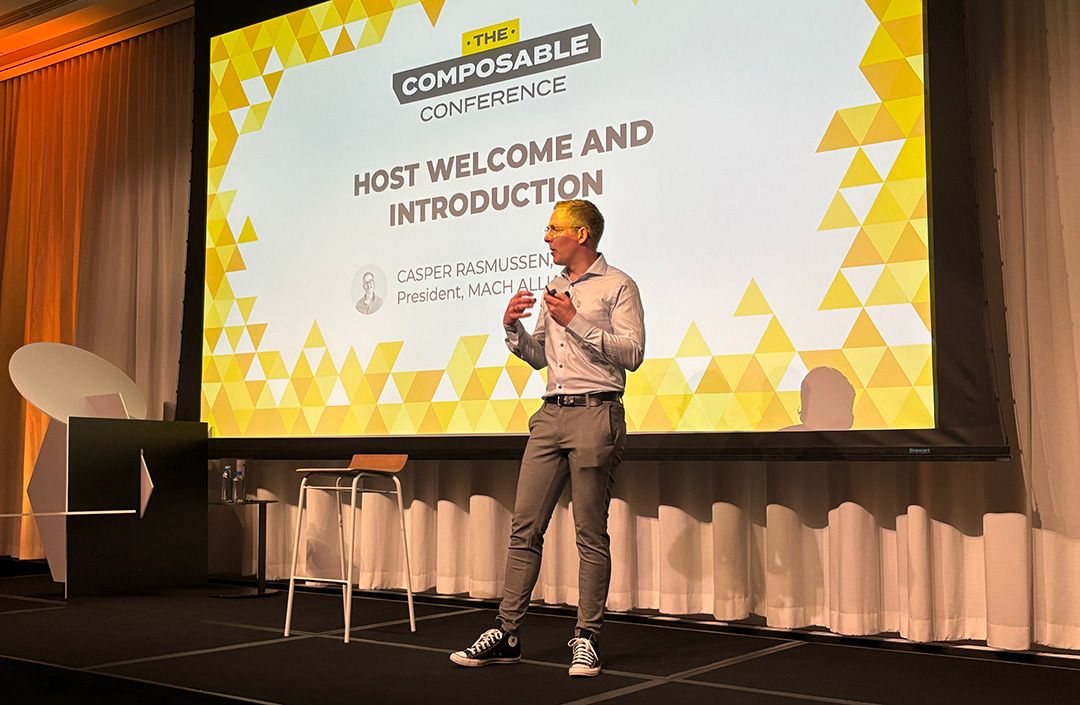
Casper Rasmussen, MACH Alliance president, during his welcome keynote.
Overcoming complexity is just one of the objectives as the MACH Alliance looks ahead. And it’s not just navigating the technical challenges. As Casper noted, the compounding effect of political instability, economic uncertainty, and human conflict are exacerbating a “collective identity crisis,” as more countries turn away from globalization to embrace tribalization and knowledge hoarding.
“It narrows our view of the world and strangles innovation,” Casper said. His recommendation: Leverage the stories from across our community and learn from one another.
To that end, attendees were presented with some fantastic sessions that provided substantive, real-world use cases. What surfaced in almost every instance was the maturity of MACH, and how it is enabling organizations to focus on other facets of their business – particularly at a time when so much change is in play.
This was best captured during Andy Goodfellow’s presentation on powering value through MACH business engines at Zoro – an online provider of tools, parts, and supplies. As CTO, Andy took the audience through the digital retailer’s early adoption of MACH, and how the establishment of an internal technology group helped them build complex and scalable applications faster and amidst significant demand.
“MACH can turn your technology into a value-driven part of your business,” he said, “so you can focus on the customer.”
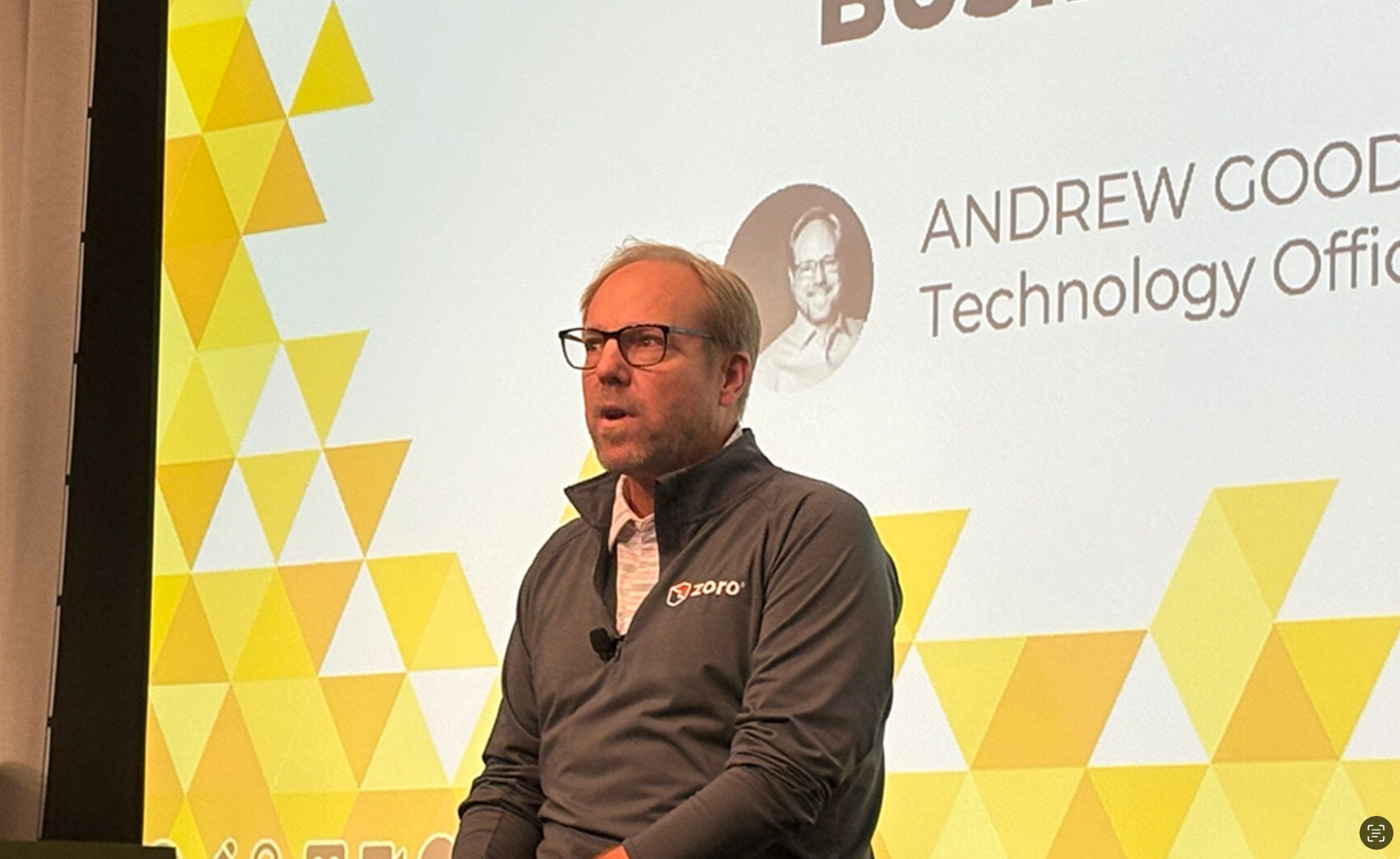
Andy Goodfellow of Zoro during his opening session.
In terms of tangible results, MACH enabled Zoro to go from 2 million SKUs to 15 million and double revenue, allowing the organization to realize both growth and profitability. They also built an acquisition and retention engine the help maintain their rabid focus on customers.
Perhaps the most profound transformation for organizations like Zoro is how MACH is unlocking the business potential, allowing them to shift from solely technical considerations to broader operational and growth goals.
“We still talk about those things, because they’re table stakes,” Andy said. “But now, we can actually talk about the business needs, and things that are important to the business.”
For most enterprises on the MACH track, rallying internal consensus for composable is still a struggle. During his main stage presentation, Shawn Mandel, CDO of Parkland – a Canadian-based retailer in the oil and gas sector – discussed how he “cajoled, coerced, and created” the transformation within his own organization.
As Shawn stated, he brought everyone along for the ride, helping his architects unravel the benefits of headless and plug-and-play capabilities. He also planted small seeds with stakeholders, enlisting them as allies to the cause. He also reminded us that it’s not about tech, but people – and they need the right kind of leaders to light the way.
“Good leaders don’t need to be the center of it all, but followers make what you do more like a movement,” he noted. “Before you lead change, teach with patience.”
Over the two days, a gaggle of other sessions led with customer examples, from Bissell’s workshop on customer data strategies to Mattel’s experiences around building a best-of-breed tech stack. Additionally, more advanced practitioners and “MACH Curious” were provided specific tracks and workshops that featured curated content based on their roles and maturity.
2. Interoperability and agentic AI are the big toppings
During the member sessions on the first day of the conference, the topic of interoperability came up in a big way. And while openness and integration have always been core to the Alliance’s mission, there has been chronic debate about just how interoperable MACH solutions really are.
One thing that’s been lagging as the Alliance has grown is the development of more tangible and actionable resources that build on the foundational reference architecture for MACH, which member companies like Contentstack have fully embraced. There’s a lot of research and thought leadership, but fewer tools in the toolbox.
Now, the Alliance is creating a cache of interoperability assets to help organizations reinforce the standards and guidelines (and more). This includes the development of an Interoperability Hub and task force, which provides more community-led stewardship.
Last week’s announcement of a new Open Data Model is also a big step forward. The initiative is aimed at resolving the persistent interoperability and integration challenges plaguing brands, SIs, and software vendors, allowing merchants to adopt the model as their own while integrators leverage it to build repeatable solutions that accelerate delivery.
The model will be made publicly available through an open source license on Github, and I’m eager to see more granular details. This is more of the kind of asset the market is asking for, specifically as they embark on AI developments leveraging frameworks like MCP (model context protocol).
Speaking of, let’s talk AI. More specifically, agentic AI. In a word, it was inescapable. The customers I spoke to at the event ran the gamut – from early-stage excitement and apprehension to full speed ahead. Regardless, most admitted to a modicum of AI fatigue.
To that end, it was refreshing to see session tracks dedicated to other facets of MACH, and not just AI-centric content. But even in those cases, AI was the undergrowth, breaking through the floorboards to steal more light from the room.
Up to this point, the Alliance hasn’t had a strong vision or position on the topic. Member organizations have been rapidly implementing AI solutions to augment their platform capabilities, but how does composable benefit their journey?
That changed last week with the launch of the new MACH AI Exchange, which will provide a professional peer network of resources to help guide real-world AI implementation for enterprises. The rollout will feature expertise from three organizations shaping the AI frontier, including Google Cloud.
Vendors are also posturing to address the AI conundrum through the composable lens. During the conference, I spoke to Sana Remekie of Conscia, a digital experience orchestration platform, about her platform’s new Universal MCP Server. The solution will enable brands to accelerate their AI agent strategies across legacy and modern systems with a single centralized orchestration layer and zero code.
“It was a natural fit,” she said, espousing the benefits of orchestration for not only agentic AI, but the rise of agentic commerce. As she noted, legacy systems are built on black box logic that lacks the modularity to adapt to the new requirements of an agentic world.
“Everyone needs to wake up and see this,” she continued. “It’s right now or never, because if you’re invisible to the agents, you're done.”
3. A piping-hot controversy brings real talk to the table
During the MACH Alliance executive board press briefing, Joe Cicman of Forrester was the first to broach the topic of VTEX, a composable commerce platform and MACH Alliance member.
If you have no idea what I’m talking about, you can read the LinkedIn post from VTEX CEO Mariano Gomide de Faria. With over 1,000 likes and 98 comments, you might even call it viral (at least for LinkedIn).
The news hit prior to the conference and was actively discussed in pockets throughout the event. That was to be expected: When it comes to airing dirty laundry, social media is a stage – and all the world’s watching.
In Mariano’s article “The MACH Mirage,” he chronicles the rampant growth of integration chaos, operational challenges, and failed projects – and preaches a return to simple architectures, killing middleware, and doubling down on retailers' real-world concerns. As part of his manifesto, he publicly suspended his company’s membership in the MACH Alliance.
I think the post makes a number of valid points. Many facets of implementation have gotten more complex, and we’ve monitored the echoes of failures from various corners of the market. But are they the result of MACH – or a product of poor planning and execution?
There have been numerous LinkedIn “town square” moments for the MACH Alliance over the years, many involving platforms that have been denied membership (around 50% of applicants). But the Alliance has strived to be transparent with its practices and provide a pathway for remediating for certification. Did these moments of public discourse help drive that change?
It's hard to gauge if the incident damaged the organization's reputation. I think the board handled the questions in stride. But it did focus the conversation on critical questions that developers face around the strict guidelines that MACH principles evangelize – and if that results in less flexibility and freedom in the DevEx and CX categories.
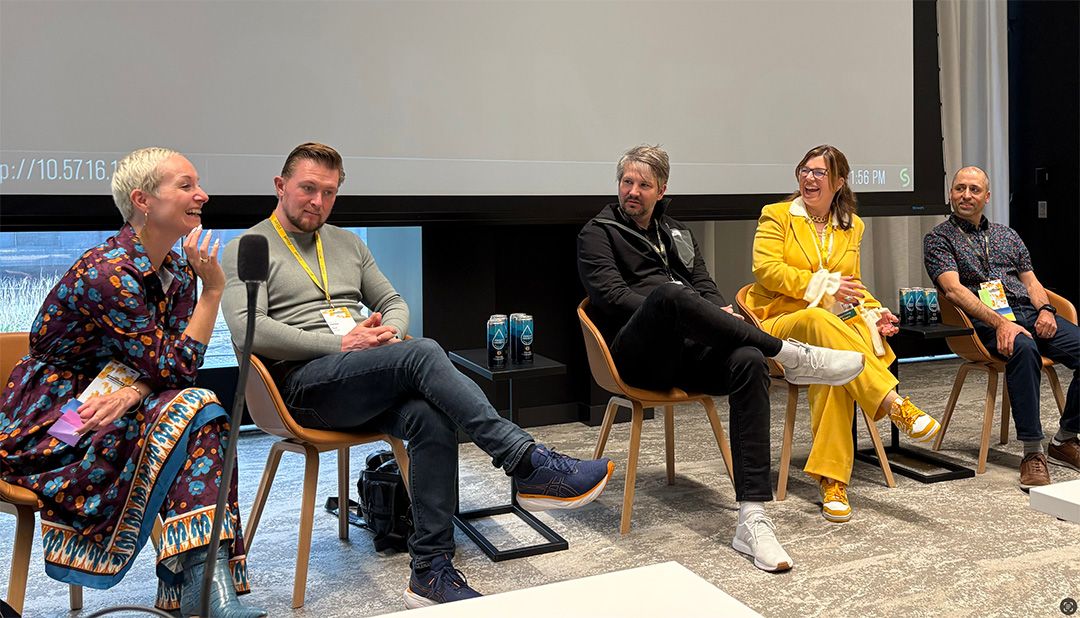
Pictured left to right: Jasmin Guthmann (Accenture Song and Board VP); Kelly Goetsch (Pipe17, Past-President & Founder Advisory Board); Malte Ubl (Vercel); Sonja Keerl (Consultant, Past-President & Founder Advisory Board); Dom Selvon (Apply Digital and Board VP)
The VTEX discussion actually shaped some of the trajectory of the conversation. Jasmin Guthmann, VP Composable Consulting at Accenture Song and Board VP, reflected on the challenges of working to a “higher degree of perfection” – and how some of the answers to criticisms around speed or responsiveness lie with innovation like the Open Data Model.
AI was, of course, a key topic. It was refreshing to hear Malte Ubl, CTO at Vercel, double down on how the fundamentals of MACH aren’t changing as it relates to agents. Bob Howland, the MACH board chairperson, also vocalized how the Alliance needs to help lead the agentic future, which is being materialized in the launch of the MACH AI Exchange.
As Casper reinforced, the focus on AI is all about making the future real.
“Our principles are 1,000 percent compatible with what stands behind agentic AI,” he said. “The Alliance has a unique opportunity to create standards. Not many businesses and brands know what their future looks like.”
With a trade war roiling across the globe and retail under mounting pressure, there were exchanges around the dollars and cents of composable, and how to support more internal buy-in when IT budgets are shrinking. While CFOs aren’t the arbiters of technology stacks, Bob Howland did emphasize the importance of their role within the context of how an entire enterprise can be impacted by MACH.
“Organizations are bad decision makers,” he said, suggesting how composability is a huge unlock for a CFO, and can help make these critical decisions easier.
When it comes to the future of MACH, the role of cloud hyperscalers can’t be understated. Krithika Ganesamoorthi, Senior Manager of Solution Architecture at AWS, gave us a glimpse of what’s ahead from a bundling perspective, and how Marketplace will be a key part of delivery.
“When moving from legacy, there’s a lot of stuff,” she said. “How do you decrease time to value? We’re using accelerators to make integration easier, and we’ve launched already with partners. We can make the approach easier, or you can pick or choose. We use Marketplace to make the entire experience easier.”
4. Education is making the dough rise even faster
I’ve covered the Alliance’s fierce commitment to education from the beginning, chatting with Casper about the ambitions to develop more robust certifications and smooth the journey to composable.
One piece that seemed to be missing was a more holistic design approach to the curriculum – one that would address the varying layers of complexity while reducing friction with usability in modern online eLearning experiences.
Just six months after launching last year, the Alliance’s new rideMACH program had already tripled its enrollment – a clear signal that the market was eager to learn and hungry for better resources. In addition to modern self-learning experiences, the program offers foundational courses with more advanced technical accreditations in pipeline. It also offers exclusive digital credentials that validate a participant’s MACH skills and knowledge.
The early success led to an expansion, with the Alliance appointing Dylan Valade, senior director of digital marketing at Abbott, as the head of the MACH Education Council.
The Alliance also made a wise move by bringing in serious expertise that aligned with the organization’s mission. At the conference, I had a chance to sit down with the team driving rideMACH: Siana Altiise, Senior Learning Designer, and James Savva, Learning Management System Administrator.
Siana, who currently designs “quiet events” worldwide as part of HumanTempo, brings a decade of learning strategy expertise to rideMACH’s instructional content. She helps deliver cohesive materials that fit the needs of students on the MACH journey, and sees the rideMACH charter as an opportunity for more inclusive learning.
“rideMACH is the only MACH-based educational platform that's available,” she said. “And we pride ourselves in that because we see the need for not only those in the MACH community or Alliance members, but those who are interested in MACH and curious about it.”
As Siana noted, the learning goes beyond the jargon and terminology and delivers knowledge through mentors and instructors from within the MACH ecosystem. It’s been carefully curated around the unique needs and learning styles of different personas, providing more successful outcomes. In her mind, this is what makes it stand apart.
“rideMACH is a special platform, and we want to make sure that people have access to that,” she said. “It's not just words on a screen, it’s words that were written by people that want to see you win.”
To illustrate rideMACH’s potential, Meriel Neighbour of Boots UK facilitated a live, high-touch rideMACH POC at the conference, which focused on delivering a clear and repeatable approach to testing ideas and building internal support.
5. The Impact Awards are the real “Chef’s Kiss”
This was my third year judging the MACH Impact Awards, and man oh man... it keeps getting harder. Almost every entry pruned the low-hanging fruit of the MACH tree, demonstrating a clear understanding and adoption of the fundamentals. The standout projects have become more complex, risky, and ambitious – and the contenders must deliver on all fronts.
And deliver they did. The winners shone with some breathtaking futureproofed solutions, driving measurable results by leveraging MACH and composable strategies.
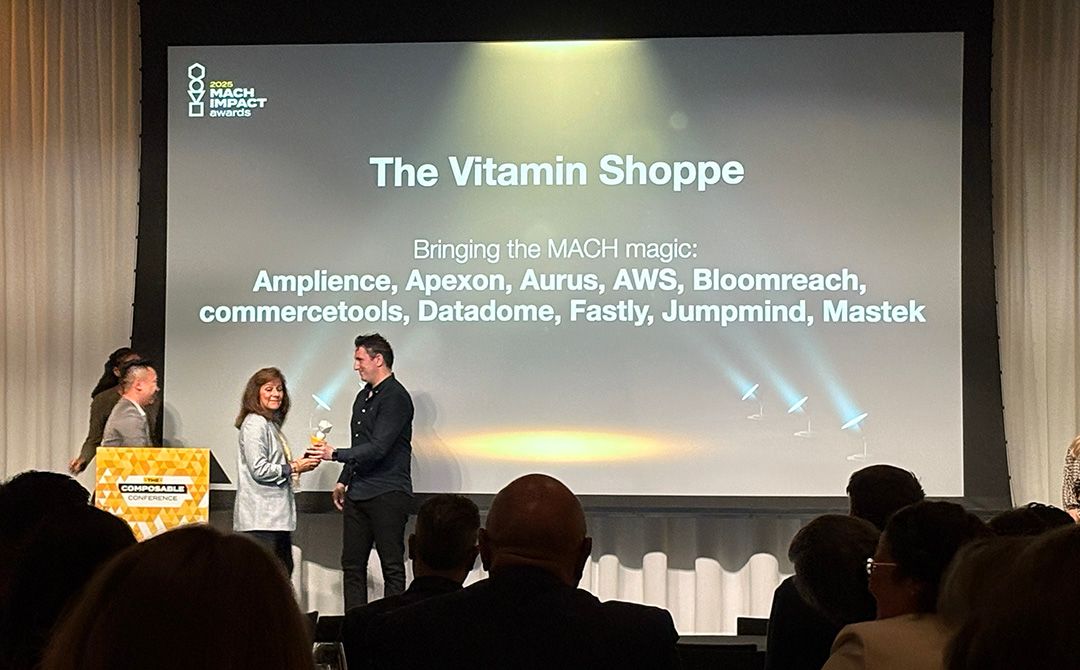
The Vitamin Shoppe receives its award for “Best Health & Wellness Project”
We received a tall stack of entries this year and narrowed it down to 14 awards. Sephora and FLEETLOOP earned top honors, and deservedly so. Both provided stunning transformations and swoon-worthy results in a competitive field.
Here’s a breakdown of winners and their respective categories:
- Grand Prix — Best Overall Change: Sephora
- Grand Prix — Best Digital Experience: FLEETLOOP
- Best Platform Transformation Projects: Sephora, Loto-Québec
- Best B2B Project: FLEETLOOP
- Best Retail Project: LKQ Europe
- Best Health & Wellness Project: The Vitamin Shoppe
- Best Travel & Tourism Project: Loto-Québec
- Best Manufacturing Project: Lallemand
- Best Breaking New Ground Projects: Mattel, Takko Fashion
- Teams of the Year: Golfbreaks, Parkland
- Contributor of the Year: Trent Dudei - Sentry Insurance
Awards programs might seem moot to some, but this platform is credible, and the applications are well-documented and highly granular. There were numerous headless CMS and composable DXP solutions in the stacks for many of these projects, and I applaud them for their role in achieving the outcomes. You can take a closer look at the details here.
Finally, it’s an honor to contribute my time and experience to this program. I always see it as an opportunity to celebrate the accomplishments in our industry. Yes, some of these projects are downright scary and remind me of just how much is on the line. But it’s also fun and rewarding to see what people are capable of building.
6. People are the secret ingredient in the MACH recipe
I saved the buttery crust for last, and that’s the MACH community – the place where the people of composable really shine. In the pantheon of user groups and vendor ecosystems, it’s a unique blend of all the right flavors, and it continues to focus on the human side of our technology industry with vigor and resolve.
It goes without saying that diversity, equity, and inclusion programs are under fire. But the MACH Alliance has stood firmly by its commitment to support equality in meaningful ways. This includes the launch of a new DEIB Scoring Tool last year, which assists organizations in assessing their posture.
As with previous conferences, the Women in MACH program was in full force, continuing its tradition of breaking boundaries. It’s grown over the years and is still squarely focused on inspiring and supporting women in MACH to develop their skills, competencies, and career paths – and drive more equal opportunities.
At the conference, it was announced that Women in MACH would now be part of an expanded program called People in MACH, which aims to build a more inclusive, dynamic, and empowering community by helping individuals thrive in the MACH ecosystem – regardless of gender, background, or expertise. The Alliance also announced a new Allyship Program to help actively support and empower women in the workplace. You can sign the pledge here.
During the press briefing, Jasmin Guthmann of Accenture Song reinforced the importance of the community element, particularly when championing social issues.
“There’s a lot of headwind on DEI, but we know it’s the right thing,” she said. “We’re better together.”
What’s next on the MACH menu?
Without question, AI is the main entrée – and the MACH Alliance is positioning the attributes of composable as the key to unlocking its potential. The community is ready for it. But guidance, in general, has been in short supply. As MACH Chairperson Bob Howland mentioned, this is a chance to shape and lead the next steps – particularly with the onset of agentic commerce.
One of the biggest questions surrounding the future of MACH is its identity. Is it a marketing platform for members? How will it continue to remain relevant and deliver value? I think the emergence of more tangible tools like the Open Data Model signals the possibilities ahead. I think we can expect more of this innovation now that adoption has become more mainstream.
While the VTEX news shook the e-commerce tree, it also codified that MACH is no longer the new kid on the block, It has been widely adopted, successfully implemented, and based on Zoro's use case, delivering results. As CTO Andy Goodfellow echoed, we now have the space to focus on the business optics – and, quite frankly, to see what's not working with MACH. In this sense, the public debate might spark healthy changes on all sides of the discourse.
Part of the calculus in all of this is speed. Brands are looking at ways to trim nanoseconds off transactions while serving up more personalized experiences at scale. AI is part of that solution, but the constant acceleration can also create missteps – and that’s where an industry conference can provide a container to slow down, connect, and better understand the impact and consequences.
For the CMS category, the Alliance community also presents opportunities to learn from other members and leverage partnerships to offer accelerated value. Problems still exist around interoperability and the need for teams to truly understand the modular mindset, and failure is always an option – especially when organizations don’t orchestrate the right way. And of course, there's the persistent question of accountability as it relates to the stack.
So take the time to adjust properly. Do the work to help your teams fully understand MACH and composable; it's essential to success. And while speed is key, be intentional and pump the brakes when necessary – especially when it comes to the breakneck pace of developing AI capabilities.
As Agility CMS’ CEO, Jina Zohori, observed: “It’s not a race. It’s a journey.”
That's a recipe we can all get down with.
Upcoming Events

CMS Summit 25
May 13-14, 2025 – Frankfurt, Germany
Don't miss the first European edition of our prestigious international conference dedicated to the global content management community! CMS Summit 25 will bring together top-notch speakers, our renowned learning format, and engaging social events. Hear from leading practitioners like Deutsche Bahn, Dr. Oetker, and more – and join customers, agencies, and CMS vendors as we discuss current trends and what's ahead for the content and digital experience fields. Connect and network at the only vendor-neutral, in-person conference focused on CMS. Space is limited for this exclusive event, so book your seats today.

CMS Connect 25
August 5-6, 2025 – Montreal, Canada
We are delighted to present the second annual summer edition of our signature global conference dedicated to the content management community! CMS Connect will be held again in beautiful Montreal, Canada, and feature a unique blend of masterclasses, insightful talks, interactive discussions, impactful learning sessions, and authentic networking opportunities. Join vendors, agencies, and customers from across our industry as we engage and collaborate around the future of content management – and hear from the top thought leaders at the only vendor-neutral, in-person conference exclusively focused on CMS. Space is limited for this event, so book your seats today.